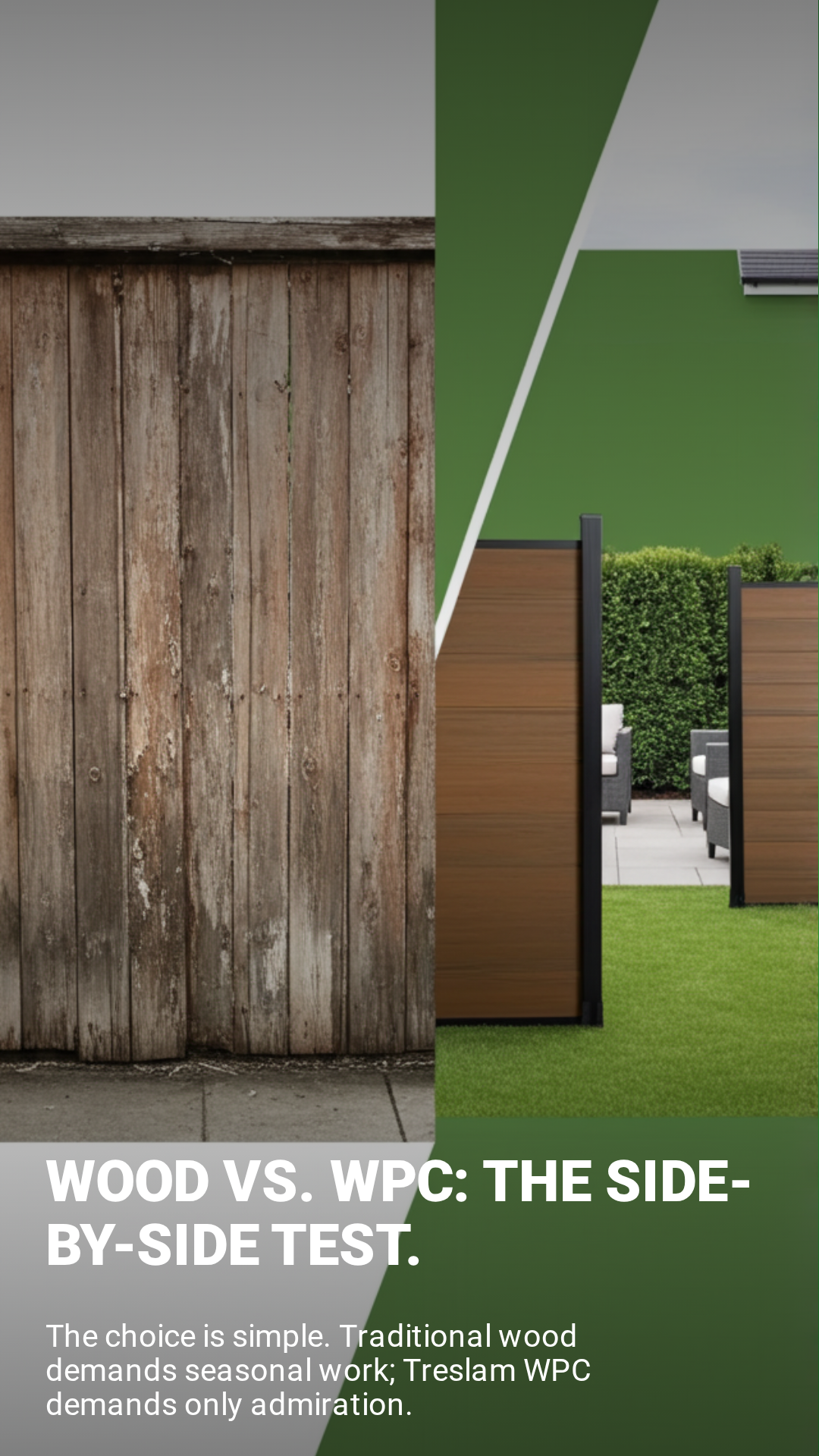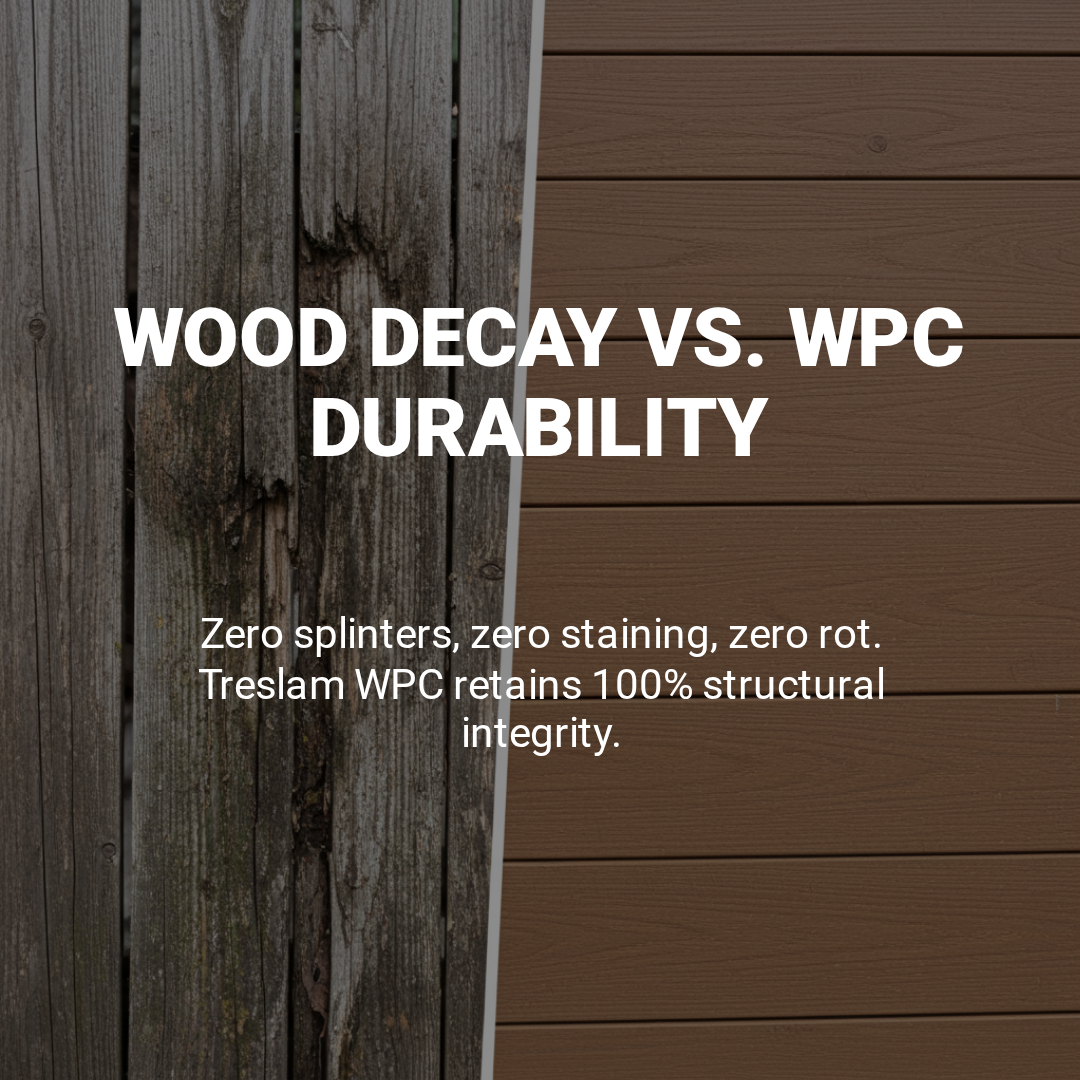For property developers, every decision comes down to the balance between initial investment and long-term value. While wood fencing may appear cheaper on a project's initial budget sheet, this perception shatters under a straightforward lifetime cost analysis. For developments where curb appeal, low maintenance, and durability are selling points, WPC fencing isn't an expense—it's a strategic investment that enhances property value and slashes long-term operational costs.
This isn't a debate about aesthetics; it's a clear-eyed comparison of total cost of ownership that will redefine how you specify fencing.
The True Cost of Wood: A Cycle of Continuous Investment
The initial price of pressure-treated wood is its primary—and only—advantage. The real costs reveal themselves over the following years, eroding profits and frustrating homeowners.
The 10-Year Financial Burden of a Wood Fence:
Annual Maintenance: A wood fence requires staining or sealing every 2-3 years to prevent graying, rot, and water damage. For a 100-meter fence, this can cost between $1,500 - $3,000 per treatment in labor and materials.
Board Replacement: It is inevitable that boards will warp, crack, or rot. A conservative estimate is replacing 3-5% of the fence annually.
Structural Failure: Wood posts are susceptible to rot at the ground level. Replacing a single compromised post can cost upwards of $300-$500 when factoring in excavation, concrete, and labor.
Warranty and Call-Backs: For developers, the hidden cost of customer complaints and warranty work on a failing wood fence can damage your reputation and eat into your profit margin.
The WPC Fencing Value Proposition: Invest Once, Install Forever
Treslam WPC fencing is engineered to eliminate the recurring costs of wood. Its superior performance is built-in, thanks to its composite core and protective co-extruded cap.
The 10-Year Financial Advantage of a WPC Fence:
Zero Scheduled Maintenance: No staining, sealing, or painting is ever required. Occasional cleaning with soap and water is all that's needed.
Near-Zero Replacement: WPC boards will not rot, warp, or splinter. The color is fused throughout the cap layer, eliminating unsightly fading.
Structural Integrity: When paired with our aluminum post system, the entire structure is immune to rot and rust, guaranteeing long-term stability.
The Side-by-Side Comparison: A 100-Meter Development Project
Let's translate this into hard numbers for a typical residential development project.
| Cost Factor | Pressure-Treated Wood Fence | Treslam WPC Fence |
|---|---|---|
| Initial Installation (Materials & Labor) | $15,000 | $25,000 |
| Maintenance (Staining every 3 years) | $1,800 x 3 = $5,400 | $0 |
| Repairs (3% annual board replacement) | $450/year x 10 = $4,500 | $200 (minor repairs) |
| Post Replacement (5 posts over 10 years) | $400 x 5 = $2,000 | $0 |
| Total 10-Year Cost | $15,000 + $5,400 + $4,500 + $2,000 = $26,900 | $25,000 + $200 = $25,200 |
The Conclusion is Unavoidable: Within just a few years, the "cheaper" wood fence becomes the more expensive option. Over a decade, a developer can save over $1,700 per 100 meters by choosing WPC, all while offering a premium, maintenance-free feature that becomes a powerful marketing tool.
The Intangible Benefits That Close the Sale
Beyond the direct cost savings, WPC fencing delivers immense value that is critical for developers:
Enhanced Curb Appeal & Faster Sales: A pristine, modern WPC fence makes a property look move-in ready and well-crafted, helping to attract buyers and close sales faster.
A Powerful Marketing Angle: "Maintenance-Free Living" is a highly desirable feature for modern homeowners. You can market the fence as a premium, worry-free benefit.
Reduced Liability: Splinter-free, sturdy fencing minimizes potential injury risks for residents, especially children.

The Bottom Line for Your Business
For a property developer, the goal is to build assets, not liabilities. Specifying wood fencing creates a long-term liability for the homeowner and a potential reputational risk for you.
Specifying Treslam WPC fencing is a capital improvement that pays for itself. It elevates the quality of your development, protects your brand's reputation for quality, and provides a tangible, valuable feature that you can market with confidence.
Ready to see the numbers for your specific project? Contact Treslam for a customized cost-benefit analysis and a quote that will make your next development more profitable.
This financial analysis is one part of a winning strategy. Discover the full range of commercial applications in our comprehensive guide: The Ultimate Guide to WPC Privacy Fencing & Commercial Applications.

